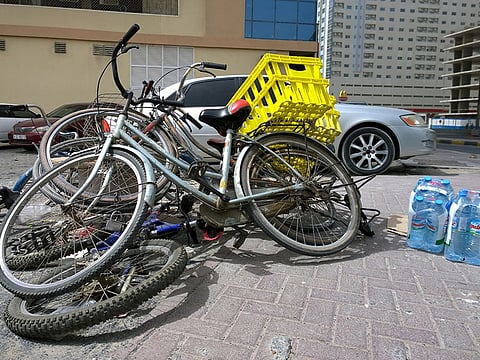200 bicycles confiscated in Al Nahda
Officials move in after dozens of bikes left illegally chained to public property

Dubai: Around 200 bicycles were confiscated in Sharjah’s Al Nahda area recently as they were illegally chained to public property, an official said.
The violation is a common sight in the densely populated residential area, with parked bicycles chained to poles of street signs and barriers.
Workers who live there take to ride to work in the adjoining industrial areas, but end up breaking the law by chaining their bikes overnight to public property creating an eyesore for residents.
Ebrahim Al Rais, head of safety and inspections department at Sharjah Municipality said so far no one had come forward to claim the seized bicycles, possibly to avoid fines or fees.
Officials are aware of the practice and are monitoring the situation, he said, adding it was becoming a regular occurrence in the area.
“We wait until the number of [illegally chained] bicycles reach a large number, then we confiscate them. It is not allowed to leave them chained to lamp posts, traffic signs or on pavements,” Al Rais said.
He said inspectors don’t immediately register a fine since there is no license plate number or record for the bicycles. “In such circumstances, we have no option but to confiscate the bicycles,” he said adding the municipality was working with the police to curb the practice.
Major Abdul Rahman Khatr, director of communications at Sharjah Police Traffic Department said the police’s role involves issuing fines to cyclists found riding on the wrong side of the road or not wearing mandatory safety jackets and helmets, but said officers cooperate with the municipality in confiscating bicycles if cyclists are found to be breaking traffic laws. The municipality provides the police with trucks and manpower needed to impound the bicycles, he said.
While the practice of chaining bicycles to public property may be an eyesore, workers say they are left with few options as designated bicycle parking racks are rare.
“Workers use bicycles to go to work in the industrial area so they don’t have to spend money on a taxi. They chain them so no one will steal them. But I don’t know why they chain them to street poles,” a worker on a bicycle said.
There have also been cases where bikes have been found heaped up in sandy areas used by residents as car parking lots.
Women’s bicycles
Surprisingly many of the workers, who are all male, were found to be riding women’s bicycles.
Shopkeepers in the industrial area said women’s bicycles are in high demand because they are “more comfortable” and cheaper than men’s cycles. On average, a used Japanese women’s bicycle costs about Dh100, compared to Dh400 for a Chinese men’s bike, they said.
Workers also find the front basket or rear carriage rack in women’s bicycles handy to carry goods such as scrap metal bits and used car parts.
Shopkeepers say workers also find the step-through or WSD (Women Specific Design) cycles with their slanted bars easier to hop on and off.



